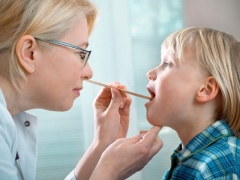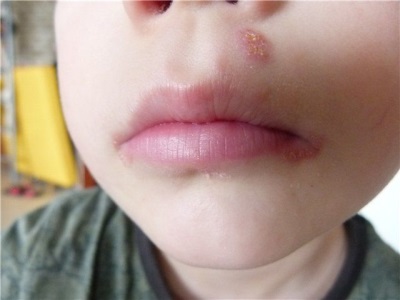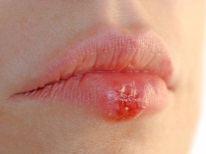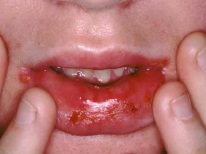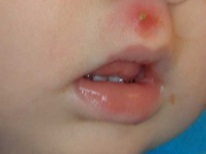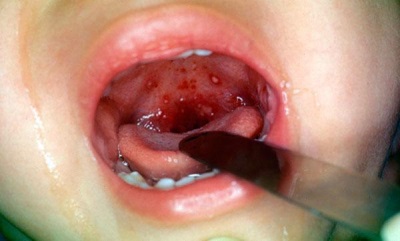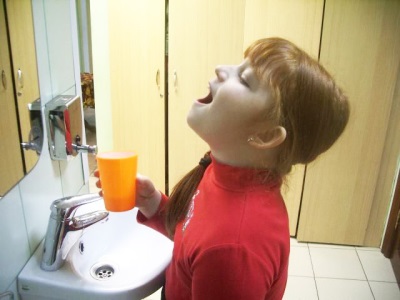Treatment of herpes stomatitis in a child
Stomatitis are common diseases in childhood, the cause of which can be infectious agents. Starting at the age of six months, the child runs the risk of contracting such a type of stomatitis as herpes.
What is it?
This is the name for stomatitis caused by the herpes virus. It manifests itself as inflammatory elements in the form of bubbles on the mucous membrane in the mouth. Also, this disease is called herpetic stomatitis.
Symptoms
Often this type of stomatitis occurs in a child much more acutely than in adulthood. The incubation period lasts an average of 2-7 days. Parents notice that the child is lethargic, drowsy, weakened, complains of headaches, lost his appetite. Next, the child may have a fever (for many babies, the fever may reach 40 degrees), the mucous membrane of the mouth becomes slightly swollen, and the submandibular lymph nodes increase.
Then the mucous membrane of the mouth becomes covered with bubbles, inside of which there is a clear liquid. Such bubbles can be single, but are more often presented by groups. Over time, their contents become cloudy, and the bubbles themselves begin to burst with the formation of sores, which are covered with a whitish bloom.
This process is characterized by great pain and burning. The child cries, behaves restlessly, cannot sleep, eat, talk. The baby’s gums may become inflamed, salivation increases, and an unpleasant odor from the mouth cavity appears. Bubble rash on the face may also occur.
The disease lasts an average of two weeks. Reinfection is possible, but each subsequent herpes stomatitis is easier.
The reasons
The main cause of the disease is infection with the herpes virus. This virus is quite common and is very contagious, so there is a risk of infection for the child in kindergarten, on a visit, on a walk, in transport and in other places. The virus can be transmitted by contact, airborne droplets and through the blood.
The following factors will contribute to infection:
- The weakening of immunity in a child.
- Injuries of the oral mucosa.
- Poor oral hygiene.
- Unbalanced nutrition.
- Hypothermia
Forms
Most often, such stomatitis develops in children aged from one to three years.
Herpes
Depending on the course of the disease, herpes stomatitis is mild, when the only manifestations of the pathology are blisters that appear in a small amount on the mucous membrane and heal quickly.
With a moderate illness in a child, more pronounced symptoms and more bubbles appear. If the baby's body temperature has increased significantly, he has a large number of inflammatory elements, there are headaches and other symptoms, this form of the disease is called severe.
Herpangina
This is the form of herpes infection, which affects the mucous membrane of the throat. The disease is manifested by the appearance of multiple whitish ulcers in the throat area, increased body temperature, weakness, sore throat, chills. In addition to the herpes virus, enteroviruses can also cause this disease. In most cases, Herpangina passes without a trace for several days (from 3 to 10), but some children have complications affecting the nervous system, heart, lungs and other organs.
Diagnostics
For the diagnosis, the doctor interviews the parents and examines the child. Detected bubbles on the mucous membrane helps to make sure that the child is really herpetic stomatitis. However, to confirm, you can also use the serological research (REEF, PCR).
Treatment
Since the disease is highly contagious, a child with herpes stomatitis should be isolated from other children. The room in which he will stay should be constantly aired. The baby should be allocated a separate towel and your dishes.
To treat this type of stomatitis should be a pediatrician, so do not hesitate to consult a doctor, especially if the child’s condition is very deteriorated. Usually the doctor will recommend an antiviral drug that affects the herpes virus.
Local treatment will be aimed at the speedy healing of ulcers and reduction of pain. To do this, use analgesic gels and frequent rinses. Antiseptic preparations and herbal decoctions are used for rinsing. With moderate and severe severity, preparations are also prescribed to strengthen the immune system.
Diet
All the food you give to the child should not be an irritant to the mucous membrane. This means that everything sour, spicy, hard, hot and salty is excluded from the baby’s menu for a while. Give him liquid meals, while choosing high-calorie foods that the child loves, so that the food gives the kid energy to recover.
Do not forget to also provide your child with a sufficient amount of drinking, because with the release of saliva and fever, children lose a lot of fluids during herpes stomatitis. Just keep in mind that drinking should not be hot. After each meal, the child must rinse his mouth, and parents must make sure that there is no more food residue in the baby’s mouth.
Prevention
To prevent infection with the herpes virus from adults, you should observe the following conditions:
- Frequent hand washing;
- Limiting contact with the sick;
- Avoiding injuries and burns of the mucous membrane;
- Strengthening the immunity of the child;
- Adequate intake of vitamins.
